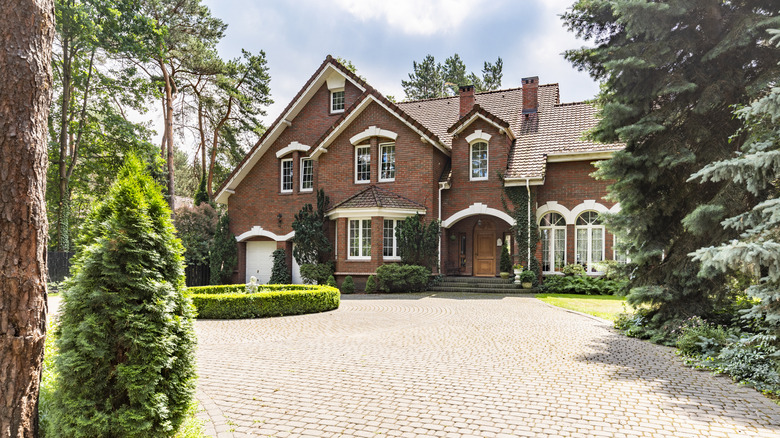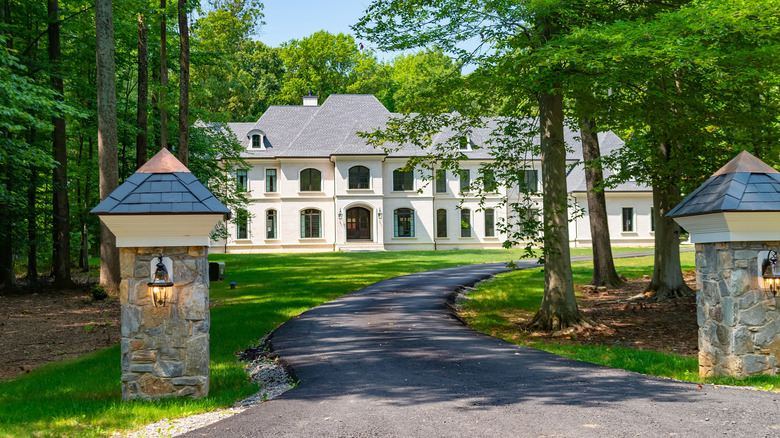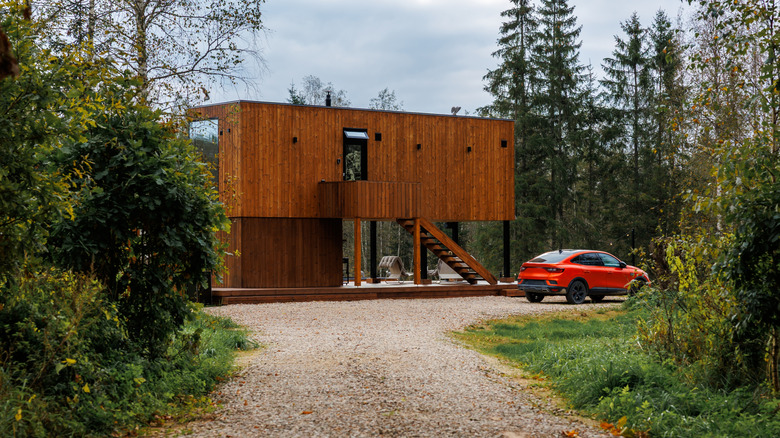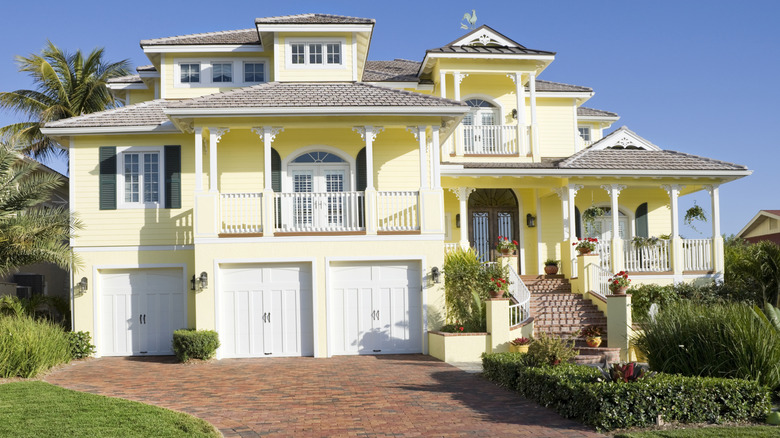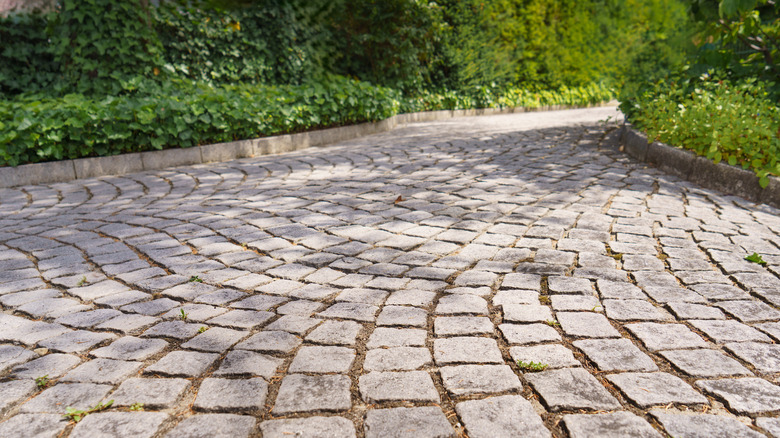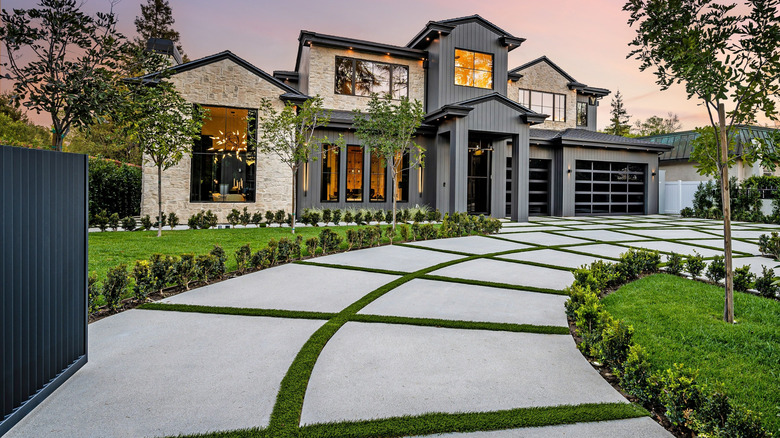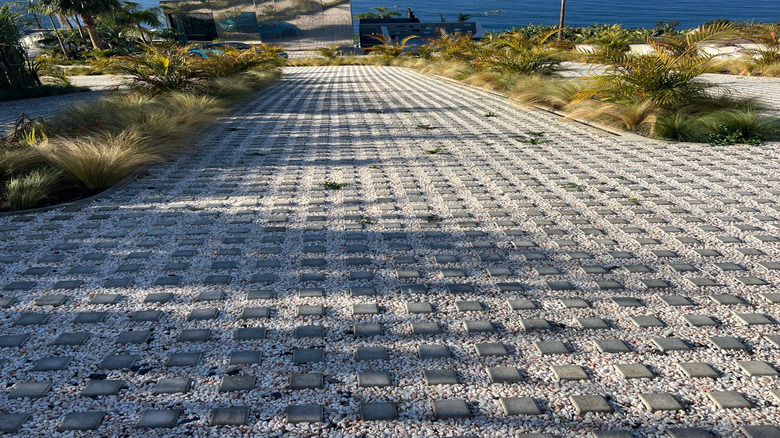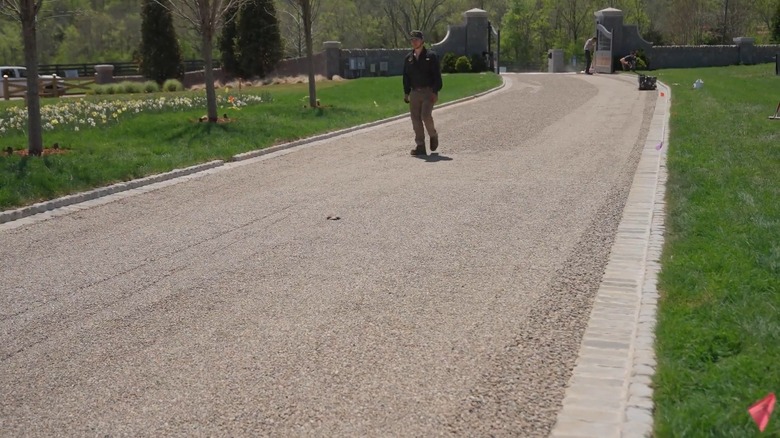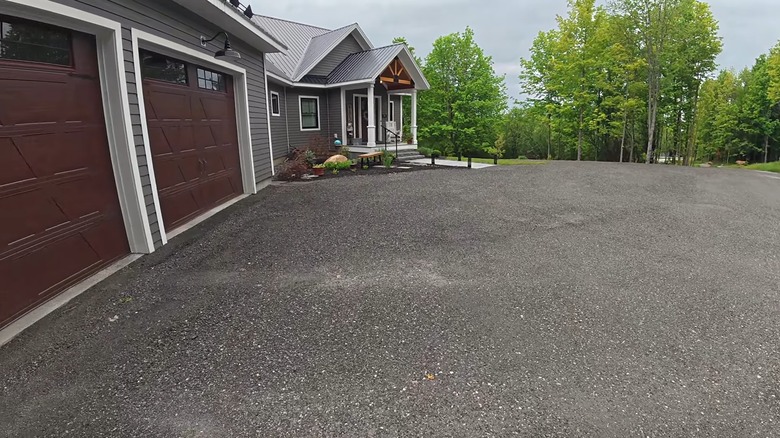8 Materials To Use On Your Driveway That Go Beyond Concrete
Concrete is a common choice of driveway material for homeowners, and for good reason. It's durable, affordable, and relatively low maintenance. The popular choice, however, isn't always the right one. Luckily, concrete is far from the only option available to homeowners. Whether you're looking for affordability, luxury, or a chance to get creative, there are several driveway materials that fit the bill, from tried-and-true materials like asphalt to more niche options like crushed shells. All of these concrete-driveway alternatives range in cost, upkeep, and style, so there's something for every homeowner.
Choosing the best material for your driveway should depend on your unique financial, aesthetic, and lifestyle needs. The right choice for you will stand up to the climate and the daily wear and tear from your vehicles. It should also align with the level of maintenance you're willing to commit to. You may also need to consider your children's and pets' safety and comfort. Further, traction and heat retention are important safety factors to consider.
Asphalt
Asphalt is an affordable alternative to concrete. It's made from recycled material and installs more quickly, reducing the upfront cost by 30% to 40% compared to concrete, according to Wells Asphalt Paving. Repairs also tend to be cheaper. In this case, lower cost doesn't mean lower quality. Asphalt driveways are a worthwhile investment. When installed and maintained properly, they can last up to 20 years. Asphalt is also a great choice for regions with significant temperature fluctuations because it's flexible enough to expand and contract without cracking.
Gravel
A gravel driveway might not look glamorous, but it's a solid option for many homes. Gravel is cheap and easy to install, especially if you have a large area to cover. It's also ideal for places that receive heavy rainfall, as water passes right through. Maintenance is simple. You'll need to top off the gravel every few years, as well as get rid of and prevent weeds from growing in your driveway. However, they're not well-suitable for places with frequent or heavy snowfall because it's difficult to remove the snow. Further, in hot, dry summers, gravel driveways can kick up a lot of dirt and dust.
Brick pavers
Brick paver driveways are often chosen for their aesthetic appeal. They offer an opportunity for creative expression. Homeowners can decide how they want the brick to be arranged, whether that be a classic straight pattern or a more unconventional design. Beyond aesthetics, brick pavers are also a practical choice, lasting up to 25 years. However, this type of driveway comes with higher upfront and long-term expenses. Expect to pay about $20 to $25 per square foot for materials and installation. Because the material is so porous, regular cleaning and resealing are necessary to keep a brick driveway in great shape, which can add to long-term costs.
Cobblestone
Cobblestone has been used for roads and walkways throughout history. In the modern world, cobblestone driveways offer a charming glimpse into the past. Cobblestones are usually granite, but they can be made from any natural stone. This type of driveway is exceptionally durable and requires little maintenance, aside from weed control. Cobblestone is one of the more expensive driveway materials, costing about $10 to $20 per square foot. If cost is a concern, you can opt for a hybrid cobblestone driveway to save money. By combining cobblestones with cheaper pavers, like concrete, you can get the look of cobblestone at a fraction of the cost.
Artificial turf
What if you want a natural but durable look? It's possible with artificial turf. It requires no mowing or watering, it's resistant to weeds, and when installed properly, it can withstand light daily use. Turf is meant to be used in conjunction with concrete, not to replace it. However, this is another chance for homeowners to get creative with driveway layouts that are sure to boost curb appeal. Whether turf is right for you is, in part, dependent on your climate. Turf can retain heat in hot regions. In high-rainfall areas, drainage should be prioritized when installing the base. In freezing climates, a frost-resistant base is equally important.
Crushed shells
For those who want to achieve a coastal aesthetic, a crushed shell driveway might be the right choice. In this type of driveway, crushed seashells are spread over a prepared base. Crushed shells are unique, environmentally friendly, and offer excellent drainage. It's also an affordable option at around $4 to $10 per square foot for materials and installation. There are a few drawbacks to crushed shell driveways. Like gravel, they'll need to be topped up periodically. They're also susceptible to weed growth. Broken shells' sharp edges can be uncomfortable to walk on and can potentially damage tires and shoes.
Chip and seal
Chip and seal driveways, also called tar and chip driveways, are made from hot asphalt topped with loose stones. This material provides the traction of gravel combined with the durability of asphalt. Many homeowners in rural areas are attracted to chip and seal driveways' low upfront cost and rustic appearance. You can expect to pay around $2 to $5 per square foot. There are a few drawbacks, however, including durability. A chip and seal driveway is not suitable for high-traffic areas. It also has a fairly short lifespan at only 10 years.
Asphalt millings
Asphalt millings are an affordable alternative to asphalt paving. Asphalt millings are created by collecting, crushing, and reusing the top layer of existing asphalt, making them an environmentally-friendly option. At about a quarter of the cost of poured asphalt, they're budget-friendly too. Asphalt millings do have some cons. Because they come from different sources, quality can vary, and there is a risk of impurities like rocks, vegetation, and even hazardous contaminants. If you choose asphalt millings, you may have difficulty getting enough for your project, as regional availability can vary.
